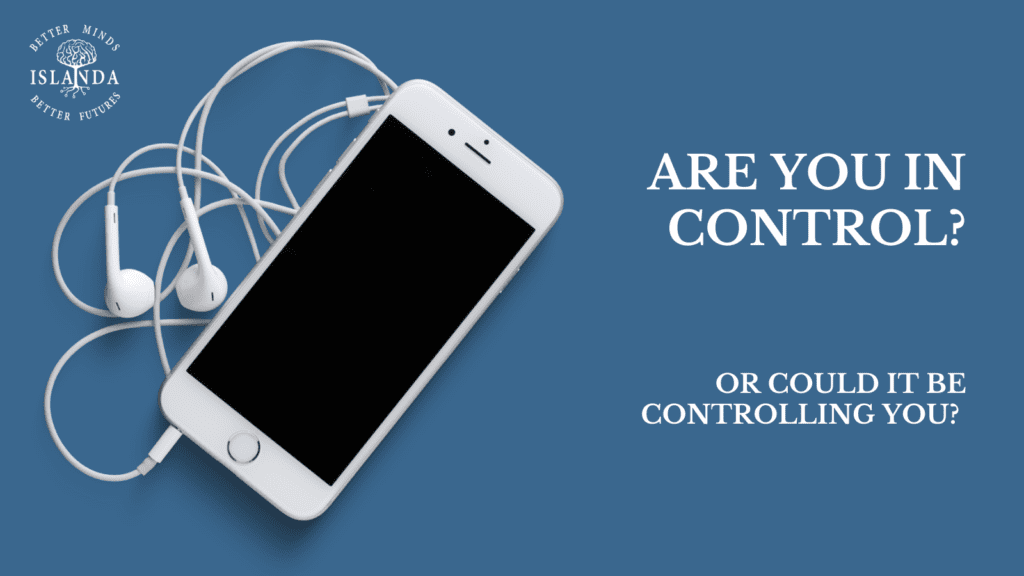Over the last few years, with enforced lockdowns and other social restrictions, we relied heavily on various virtual technologies for social connection.
But could that lifeline, that kept us connected to the outside world, now have turned into our worst enemy?
Indeed, could phone use be stifling the development of key life skills, such as:
- Connection – reducing opportunities to practise social interaction;
- Communication – things are often said virtually that would not be said face to face;
- Self-control – why wait till next week to watch the next episode when you can watch the whole series now?
- Motivation & creativity– with so much easily accessible knowledge, information and entertainment, there are less opportunities to experience curiosity or boredom, emotions that drive us to seek out new experiences or learning opportunities or to be creative
- Self-confidence – editing tools encourage a desire for perfectionism and fuel fears of inadequacy, criticism, failure, rejection etc
And it seems to creep up on you – one minute you’re in control and the next, the balance of control has flipped – something I noticed when my 18 year old daughter was struggling to revise, in spite of her A-level exams being imminently close.
She was doing all the right things to motivate herself and take the right actions.
And yet her attention was continually distracted. The lure of the phone was just too much.
This isn’t about judging her behaviour or our parenting techniques. Rather, this is about understanding what was driving this unhelpful behaviour pattern, and stopping her from making the right decisions with regards to her phone.
She simply appeared unable to make the right decision and had developed a really unhealthy habit, possibly even addiction, to her phone.
Does this sound familiar?
Working in schools, I know this story is not unique to my daughter, and it’s not only teenagers that are affected.
And the sad thing is, the tech companies know there is a problem. I am not denying that technology is game-changing when we use it functionally and intentionally. The challenge is when we no longer feel in control of how we use it, when the tech ‘controls us’.
I recommend watching the docudrama Social Dilemma on Netflix. You will discover how phones and social media platforms are designed for optimal user experience and engagement.
By design, they trigger the emotions that drive our behaviours to reach for them all the time. Amongst other things, they feed our need for social connection, approval and inclusion, as well as being a great tool for distraction.

So how can you regain control and change a bad habit?
In short, it’s all about design, creating the conditions that enable new behaviours that support your goals and disable those unhelpful behaviours that sabotage them.
The 3 keys to creating habits:
KEY 1: Prompt something that reminds us to carry out the behaviour.
Step 1 Identify all prompts. For phones it could be:
- Emotional – an inner drive such as an urge to do it, or guilt, if you haven’t done it
- Visual – seeing the phone or having notifications popping up
- Contextual – if you always use it when others are using theirs, waiting at the bus stop or when you watch TV etc
- Linked to a routine or habit – such as when you have a lunch break
Step 2: Decide on how to manage these prompts. This will depend on how strong the inner motivation is as well as your willpower to resist. Options include:
- Remove the prompt completely – this might involve taking the phone away, removing notifications or apps etc
- Avoid prompts by not doing those things that remind you to do it. This can be a temporary measure until a new behaviour has been established or possibly permanent.
- Ignore the prompt by being aware of all prompts and setting clear intentions to ignore them. Be mindful that this option requires willpower, something that becomes depleted when tired or may be insufficient if the habit is too strong, such as an addiction
KEY 2: Ease/ability – behaviours are established when they are easy to do and require minimal time, money or effort. Therefore, to stop a habit you need to make it hard to do.
A WORD OF WARNING: In stopping a habit, the higher the inner motivation, the harder it needs to be – you may need to get creative!
For example:
- Make the phone hard to access – put it on top of a cupboard that you need a ladder to get to or hide it completely if you are supporting someone else (hide well as my daughter found it in the food cupboard!!)
- Install a series of hard to remember passwords
- Charge a fee for access
- Clash screen time with another habit that is more enticing eg hobbies
KEY 3: Motivation – desire to do the behaviour and achieve the associated goal
This one is probably the most important element as emotions create habits – if it feels good, we will do it again.
In addition, our phones are likely to achieve many goals, and fulfil many emotional needs such as social connection, approval, feeling included, entertainment etc
If you remove it completely, or considerably lessen use, there needs to be a strategy to ensure it feels good, suffering is minimised, and all needs are met.
For example:
- Connection – how will you stay connected to your peer groups and are up to date with discussions?
- Approval – how can you build self-confidence with less need for external validation?
- Inclusion and avoidance of FOMO (fear of missing out)
- Entertainment – what will you do when you are bored?
For my daughter this involved creating a strategy with a few key people in her network so they understood what she wanted to achieve and supported her in ensuring she was kept up to date of events & discussions, times were agreed for connecting and there was less perceived ‘criticism’ for her lessened engagement.
And finally,
Be conscious of your own phone habits – a key method of learning is modelling the behaviour of others – are you modelling good behaviours?
I hope this has inspired you to reflect on phone habits and who’s in control, as well as providing some inspiration on how to re-design any unhealthy habits.
Please share this idea with anyone who you feel may benefit and if you need support please get in touch with me at [email protected].
Here’s to success. Until next time!
